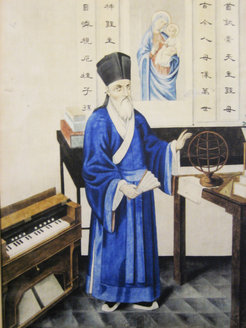Performing Normativities. The Chinese Rites Controversy in the Juridical Practices in Macao, Taiwan, and Manila (17th-18th century)
Forschungsprojekt
Along the border to China and the Iberian empires, three cities or regions, namely Macao, Taiwan and Manila, constituted one of the most significant trade routes since the 16th century, and not only with regard to the exchange of Mexican silver for Chinese porcelain, silk, and tea, but also its contribution to the global circulation of normative information. During the 17th and 18th centuries, the Chinese Rites Controversy, a dispute over the religiosity of Confucianism and Chinese rituals, emerged. These prolonged and profound debates were recorded in numerous letters and reports from opposing missionary orders, in catechisms and pragmatic manuals for local missions, as well as in juridical archives in Macao, Taiwan, and Manila. All of these served as a resource for the drafting of papal decrees, bulls, or even the relevant chapter in the Qing Code. The aim of this project consists in examining the debates from the perspective of global legal history.

This project combines a global perspective with local studies in territories situated between the border to the Chinese and Iberian empires, and it seeks to provide insights into how the controversy about rites help us to get a better sense of the broader spectrum of multinormativity: from moral theology and Confucianism to pragmatic standards of behavior and the legal basis of jurisdictions. Moreover, it will show how such normative information circulated, how it interacted, how it was interpreted and even how it was (re)produced in actions, including the corresponding praxeological mechanisms underlying those actions. Finally, this project further inquiries into how identities are (re)constructed in the performance of rite/ritual to (re)form traditions and inter-traditional orders within the flow of everyday practices.
Methodologically, the project uses methods of global legal history, transnational and cross-cultural communication, cultural translation, and multinormativity. The project also draws on praxeological approaches in producing meaning and normative orders. Based on an empirical study of local archives, this project seeks to improve our understanding of rite/ritual as a normative and performative concept: Firstly, the rite/ritual is an intermediary concept used by and among European missionaries, Chinese, and indigenous people, and it possesses the potential to serve as in-road for the intercultural communications of normativities. Secondly, this study on rite/ritual in juridical practices can emancipate the rigid understanding of the Chinese legal tradition from the binary category of rite/ritual (Li) and Law (Fa), which is derived from a Eurocentric legal idea and dominates how Chinese legal historiography is written. Thirdly, with regard to the process of glocalisation, by examining this almost equal but nevertheless asymmetric dialogue on Chinese rituals over the span of 200 years, this project attempts to provide a model of global legal history quite distinct from the more familiar imperial or post-colonial narratives.
